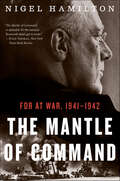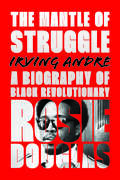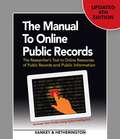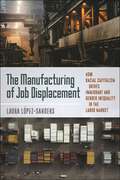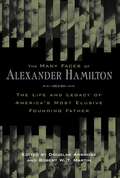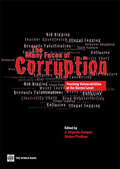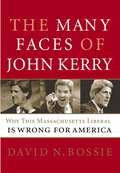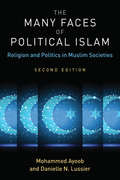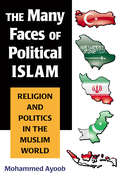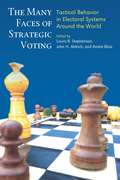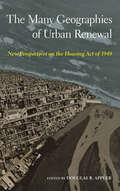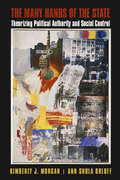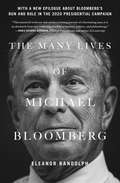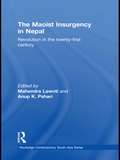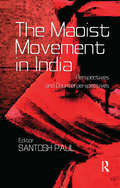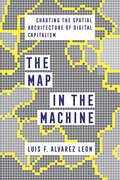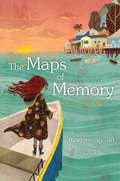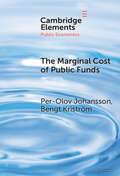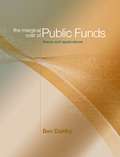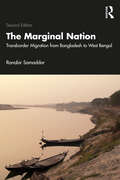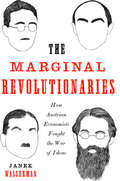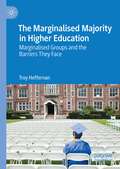- Table View
- List View
The Manor and the Borough (Routledge Revivals)
by Beatrice WebbOriginally published in 1963, this book examines the English Local Government, and more specifically, the Manor and the Parish, considering the various exemptions, immunities and franchises which enabled the inhabitants of particular localities to exclude the authority of the county at large, or that of one or other of its officers, and thereby enjoy, within their own favoured areas, some peculiar forms of self-government. The book includes chapters on the city and borough of Westminster, the boroughs of Wales, administration by municipal democracies and the municipal revolution.
The Mantle of Command: FDR at War, 1941–1942 (Fdr At War Ser.)
by Nigel HamiltonThis intimate biography reveals how FDR took personal charge of the military during WWII: “Splendid . . . the memoir Roosevelt didn’t get to write” (New York Times Book Review).Based on years of archival research and interviews with the last surviving aides and Roosevelt family members, Nigel Hamilton offers a definitive account of FDR’s masterful—and underappreciated—command of the Allied war effort. Hamilton takes readers inside FDR’s White House and into the meetings where he battled with Churchill about strategy and tactics and overrode the near mutinies of his own generals and secretary of war. Time and again, FDR was proven right and his allies and generals were wrong. When the generals wanted to attack the Nazi-fortified coast of France, FDR knew the Allied forces weren’t ready. When Churchill insisted his Far East colonies were loyal and would resist the Japanese, Roosevelt knew it was a fantasy. As Hamilton’s account reaches its climax with the Torch landings in North Africa in late 1942, the tide of war turns in the Allies’ favor and FDR’s genius for psychology and military affairs is clear. The Mantle of Command “will undoubtedly change the way we see Franklin Roosevelt” (Christian Science Monitor).“Masterly.” —Wall Street Journal
The Mantle of Struggle: A Biography of Black Revolutionary Rosie Douglas
by Irving AndreRosie Douglas, former prime minister of Dominica, had a life unlike any other modern politician. After leaving home to study agriculture in Canada, he became a member of the young Conservatives, under the Canadian prime minister’s guidance. However, after he moved to Montreal to study political science his politics started to shift. By the late sixties he was an active civil rights supporter and when Black students in Montreal began to protest racism in 1969, he helped lead the sit-in. He was identified as a protest ringleader after the peaceful protest turned into a police riot, and served 18 months in prison. After his deportation from Canada in 1976, having been named a danger to national security, Douglas participated in political movements around the world building global solidarity. He became a leader of the Libyan-based revolutionary group World Mathaba and supported Nelson Mandela’s African National Congress. Once back home in Dominica, he led the movement for Dominica’s full political independence from Great Britain, then served as a senator in the post-independence government, an MP, party leader, and finally prime minister. Relying on family sources, interviews, newspaper articles, government documents, and Douglas’ own articles, letters, and speeches, Irving Andre has drawn a rich and riveting record of this important Black revolutionary.
The Manual to Online Public Records: The Researcher's Tool to Online Resources of Public Records and Public Information
by Hetherington Sankey<p>In the 4th edition of The Manual to Online Public Records, authors Sankey and Hetherington shed new light on the mystique of finding public records from government and private sources. The What, Where, and How of online public record access is contained herein on a nationwide basis. <p>Two words epitomize the benefits readers will gain from this completely revised 4th edition: efficiency and accuracy. <p>New chapters explore how to analyze record searching methodology and how to best use social media sites for advanced, creative techniques of finding electronic and paper trails of records. <p>An analysis of 15,000+ government sites is arranged in individual state chapters. Data is presented in a format that is easy-to-use and practical in wording as well as spiked with subjective comments on value and benefits. Readers will soon learn of detailed information on key locations, including data not found from a Google Search. <p>The Manual also provides techniques on how to narrow the overwhelming array of vendors to find those sites that best suit a researcher's needs. <p>More than any of the earlier editions, this resource provides the competitive edge for concise record research.</p>
The Manufacturing of Job Displacement: How Racial Capitalism Drives Immigrant and Gender Inequality in the Labor Market
by Laura López-SandersThe employer-driven push to systematically replace Black workers with unauthorized immigrantsIn The Manufacturing of Job Displacement, Laura López-Sanders argues that the walls of American businesses hide a system of illegal practices and behaviors that lead to racial inequality in the labor market. Drawing on extensive research in South Carolina manufacturing facilities, nearly 300 interviews, and her own experience working at both the “bottom” of the labor market (e.g., cleaning toilets and on assembly-line jobs) and in mid-level supervisory positions, López-Sanders provides a behind-the-scenes accounting of daily factory life.She uncovers preferential hiring practices that fly in the face of civil rights legislation barring employment discrimination, including orchestrated actions of employers to systematically replace Black workers with Hispanic unauthorized immigrants. López-Sanders argues against the predominant view that worker displacement occurs primarily because of hiring biases or social networks. Instead, she shows that employers intervene strategically, relying on subcontractors, agencies, use and intermediaries to shift the race and gender in an organization. They also vulnerable and tractable immigrant labor to impose and justify untenable standards that drive native-born workers out of their jobs and create vacancies to be filled by additional immigrant workers. The Manufacturing of Job Displacement sheds new light on a classic question about ethnic succession and segmentation in the labor market and reorients the ongoing debates about the economic impact of immigration.
The Many Faces of Alexander Hamilton: The Life and Legacy of America's Most Elusive Founding Father
by Robert W. Martin Douglas AmbroseThis anthology presents a variety of scholarly perspectives on the nation&’s most enigmatic Founding Father. Revolutionary War officer, co-author of the Federalist Papers, our first Treasury Secretary, Thomas Jefferson&’s nemesis, and victim of a fatal duel with Aaron Burr: Alexander Hamilton&’s legacy is complex, multifaceted, and difficult to pin down. On the one hand, Hamilton was the quintessential Founding Father, playing a central role in every key debate and event in the Revolutionary and Early Republic eras. On the other hand, he has received far less popular and scholarly attention than his brethren. Was Hamilton a closet monarchist or a sincere republican? A victim of partisan politics or one of its most active promoters? A lackey for British interests or a foreign policy mastermind? The Many Faces of Alexander Hamilton addresses these and other perennial questions. Leading Hamilton scholars, both historians and political scientists alike, present fresh evidence and new, sometimes competing, interpretations of the man, his thought, and the legacy he has had on America and the world.
The Many Faces of Corruption: Tracking Vulnerabilities at the Sector Level
by J. Edgardo Campos Sanjay PradhanCorruption... How can policymakers and practitioners better comprehend the many forms and shapes that this social pandemic takes? From the delivery of essential drugs, the reduction in teacher absenteeism, the containment of illegal logging, the construction of roads, the provision of water and electricity, the international trade in oil and gas, the conduct of public budgeting and procurement, and the management of public revenues, corruption shows its many faces. 'The Many Faces of Corruption' attempts to bring greater clarity to the often murky manifestations of this virulent and debilitating social disease. It explores the use of prototype road maps to identify corruption vulnerabilities, suggests corresponding 'warning signals,' and proposes operationally useful remedial measures in each of several selected sectors and for a selected sample of cross cutting public sector functions that are particularly prone to corruption and that are critical to sector performance. Numerous technical experts have come together in this effort to develop an operationally useful approach to diagnosing and tackling corruption. 'The Many Faces of Corruption' is an invaluable reference for policymakers, practitioners, and researchers engaged in the business of development.
The Many Faces of John Kerry: Why this Massachusetts Liberal is Wrong for America
by David BossieA hard-hitting, ruthlessly honest political biography of Sen. John F. Kerry that will expose the real views of and dig up all the dirt on the 2004 Democratic nominee for president. In Prince Albert, he dethroned Al Gore. Now, David N. Bossie, former chief investigator for Congress, is going after John Kerry and giving every conscientious voter a chance to see the truth about this year's Democratic candidate. Using his trademark in-depth investigating, Bossie gives readers the real scoop on the presidential challenger-fully exposing Kerry's peculiar voting record; early Naval discharge (so he could protest the Vietnam War); self-contradictory positions on such vital issues as health care, education, and campaign finance; and shady political dealings he'd rather voters not know about. With an exclusive jailhouse interview with former Kerry finance chairman, David Bossie has the insider's access and the hard-nosed investigator's savvy to ferret out the truth and present it to readers in a gripping, no-nonsense style. He lays bare Kerry's flip-flops, lies, and duplicitous stances on the war in Iraq, defense spending, tax cuts, Medicare, and corporate greed and corruption-finally unveiling all of Kerry's public and private faces.
The Many Faces of Political Islam, Second Edition: Religion and Politics in Muslim Societies
by Mohammed Ayoob Danielle N. LussierAnalysts and pundits from across the American political spectrum describe Islamic fundamentalism as one of the greatest threats to modern, Western-style democracy. Yet very few non-Muslims would be able to venture an accurate definition of political Islam. Fully revised and updated, The Many Faces of Political Islam thoroughly analyzes the many facets of this political ideology and shows its impact on global relations.
The Many Faces of Political Islam: Religion and Politics in the Muslim World
by Ayoob MohammedAnalysts and pundits from across the American political spectrum describe Islamic fundamentalism as one of the greatest threats to modern, Western-style democracy. Yet very few non-Muslims would be able to venture an accurate definition of political Islam. Mohammed Ayoob's The Many Faces of Political Islam thoroughly describes the myriad manifestations of this rising ideology and analyzes its impact on global relations.
The Many Faces of Strategic Voting: Tactical Behavior in Electoral Systems Around the World
by André Blais John H Aldrich Laura B StephensonVoters do not always choose their preferred candidate on election day. Often they cast their ballots to prevent a particular outcome, as when their own preferred candidate has no hope of winning and they want to prevent another, undesirable candidate’s victory; or, they vote to promote a single-party majority in parliamentary systems, when their own candidate is from a party that has no hope of winning. In their thought-provoking book The Many Faces of Strategic Voting, Laura B. Stephenson, John H. Aldrich, and André Blais first provide a conceptual framework for understanding why people vote strategically, and what the differences are between sincere and strategic voting behaviors. Expert contributors then explore the many facets of strategic voting through case studies in Great Britain, Spain, Canada, Japan, Belgium, Germany, Switzerland, and the European Union.
The Many Faces of Tolerance: Attitudes toward Diversity in Poland (Routledge Studies in Political Psychology)
by Ewa A. GolebiowskaThis book presents a systematic account on Poles’ attitudes toward ethnic, religious, political, and sexual minorities. It investigates Poland’s reputation as an intolerant, anti-Semitic, and homophobic country. Counter to a simplistic image of Poland as a hotbed of intolerance, the book shows that Polish intolerance has many faces. For one thing, Poles’ attitudes toward diversity vary from one group to another. For another, the extent to which Poles’ attitudes are more or less negative depends on the right or activity they are asked to support and who the respondents happen to be. The book is the most comprehensive and empirically sophisticated synthesis of Poles’ attitudes toward diversity to date. Previous research tends to describe Poles’ attitudes toward a single minority at a time and only examines subgroup differences in their thinking about diversity. The Many Faces of Tolerance is a multi-faceted analysis of Poles’ sentiments toward historically and currently discriminated against groups that assesses Poles’ acceptance of different minorities and authoritatively analyzes its sources. As part of this endeavor, the book develops a ranking of influences on Poles’ tolerance, undertakes a forecasting of future changes in tolerance in Poland, and proposes practical strategies to ameliorate existing intolerance.
The Many Geographies of Urban Renewal: New Perspectives on the Housing Act of 1949
by Douglas R. ApplerThe consequences of the federal Housing Act of 1949—which supported the clearance and redevelopment of “blighted” areas across the nation—were felt by communities of all sizes, not just large cities. The Many Geographies of Urban Renewal presents a more comprehensive view of the federal urban renewal program by situating the experiences of large cities like Baltimore, MD and Philadelphia PA alongside other geographies, such as the small city of Waterville, ME, suburban St. Louis County in Missouri, the State of New York, the Commonwealth of Puerto Rico, and others. Chapters identify trends and connections that cut across jurisdictional boundaries, investigate who used federal funds, how those funds were used, and examine the profound short and long-term consequences of the program. Taken as a whole, the essays showcase the unexpected diversity of how different communities used the federal urban renewal program. The Many Geographies of Urban Renewal allows us to better understand what was arguably the most significant urban policy of the 20th century, and how that policy shaped the American landscape. Contributors include Francesca Russello Ammon, Brent Cebul, Robert B. Fairbanks, Leif Fredrickson, Colin Gordon, David Hochfelder, Robert K. Nelson, Benjamin D. Lisle, Stacy Kinlock Sewell and the editor.
The Many Hands of the State
by Morgan Kimberly J. Orloff Ann SholaThe state is central to social scientific and historical inquiry today, reflecting its importance in domestic and international affairs. States kill, coerce, fight, torture, and incarcerate, yet they also nurture, protect, educate, redistribute, and invest. It is precisely because of the complexity and wide-ranging impacts of states that research on them has proliferated and diversified. Yet, too many scholars inhabit separate academic silos, and theorizing of states has become dispersed and disjointed. This book aims to bridge some of the many gaps between scholarly endeavors, bringing together scholars from a diverse array of disciplines and perspectives who study states and empires. The book offers not only a sample of cutting-edge research that can serve as models and directions for future work, but an original conceptualization and theorization of states, their origins and evolution, and their effects.
The Many Lives of Michael Bloomberg: Innovation, Money, And Politics
by Eleanor RandolphWith unprecedented access, the veteran New York Times reporter and editorial writer who covered New York City and state politics offers a revealing portrait of one of the richest and famously private/public figures in the country. Business genius, inventor, innovator, publisher, philanthropist, activist, and sly wit Michael Bloomberg.Michael Bloomberg’s life sounds like an exaggerated version of The American Story, except his adventures are real. From modest Jewish middle class (and Eagle Scout) to Harvard MBA to Salomon Brothers hot shot (where he gets “sent upstairs” and later fired) to creator of the machine that would change Wall Street and the rest of the world and make him a billionaire (a description by the author makes the invention clear to non-engineers). Randolph’s account of Bloomberg’s life and time reads almost like a novel, a quintessentially American story. She explains the “machine” he invented that gave and continues to give instant access to an infinite amount of information to bankers and investors on how, what, and where to invest, and how it changed the financial universe. Randolph recounts one day not long ago when the Bloomberg machine briefly blipped and the whole world’s financial marketplace came to a halt. Randolph recounts Mayor Bloomberg’s vigorous approach to New York city’s care—including his attempts at education reform, contract control, anti-smoking and anti-obesity campaigns, green climate control, and his political adventures with both aides and opponents. After a surprising third term as Mayor, Bloomberg returned to his business and doubles its already tremendous worth. The chapter that describes this is one of the most revealing of his temperament and energy and vision as well as how he spends his “private” time—private but convivial. Bloomberg’s philanthropies are education, anti-NRA, and supporting a cleaner environment. He is a moderate liberal in a time when that quality holds the future of the Democratic Party and the country to account.
The Maoist Insurgency in Nepal: Revolution in the Twenty-first Century (Routledge Contemporary South Asia Series)
by Mahendra LawotiThe book deals with the dynamics and growth of a violent 21st century communist rebellion initiated in Nepal by the Communist Party of Nepal (Maoist) – CPN(M). It contextualizes and explains why and how a violent Maoist insurgency grew in Nepal after the end of the Cold War, in contrast to the decline of other radical communist movements in most parts of the world. Scholars from diverse disciplinary backgrounds employ a wide variety of approaches and methods to unravel different aspects of the rebellion. Individual chapters analyze the different causes of the insurgency, factors that contributed to its growth, the organization, agency, ideology and strategies employed by the rebels and the state, and the consequences of the insurgency. New issues are analysed in conjunction with the insurgency, such as the role of the Maoist student organization, Maoist's cultural troupes, the organization and strategies of the People's Army and the Royal Nepal Army, indoctrination and recruitment of rebels, and international factors. Based on original field work and a thorough analysis of empirical data, this book fills an existing gap in academic analyses of the insurgency in Nepal.
The Maoist Movement in India: Perspectives and Counterperspectives
by Santosh PaulThis book presents the raging debate on one of the most brutal political realities that India has confronted in recent years: the rising conflict between Maoist insurgent groups and the Indian State. With some of the finest writings on the subject, it brings together articles and interviews from leading authors, politicians, journalists, intellectuals, filmmakers and legal practitioners. The volume straddles between two apparently irreconcilable perspectives: (a) the view that the Maoist movement threatens the very core of democratic foundations, and should be perceived as a violent law & order situation justifying severe retaliatory measures, and (b) the counterview where Maoists are fiercely defended as revolutionaries and comrades of resistance, and the movement seen as the last-ditch struggle by those who have been abandoned over years by the State in its developmental process. The essays probe whether armed struggle is avoidable, whether the desperate desire for peace has simply been overtaken by political ideologies, and whether an inclusive developmental State policy may help restore faith in its democratic ethos. The book will be of interest to academics and students of politics, sociology, social anthropology and law. It will also be extremely useful to social workers, policymakers, politicians, bureaucrats, as well as the general reader.
The Map in the Machine: Charting the Spatial Architecture of Digital Capitalism
by Luis F. Alvarez LeonDigital technologies have changed how we shop, work, play, and communicate, reshaping our societies and economies. To understand digital capitalism, we need to grasp how advances in geospatial technologies underpin the construction, operation, and refinement of markets for digital goods and services. In The Map in the Machine, Luis F. Alvarez Leon examines these advances, from MapQuest and Google Maps to the rise of IP geolocation, ridesharing, and a new Earth Observation satellite ecosystem. He develops a geographical theory of digital capitalism centered on the processes of location, valuation, and marketization to provide a new vantage point from which to better understand, and intervene in, the dominant techno-economic paradigm of our time. By centering the spatiality of digital capitalism, Alvarez Leon shows how this system is the product not of seemingly intangible information clouds but rather of a vast array of technologies, practices, and infrastructures deeply rooted in place, mediated by geography, and open to contestation and change.
The Maps of Memory: Return to Butterfly Hill (The Butterfly Hill Series)
by Marjorie AgosinIn this inspiring sequel to the Pura Belpré Award–winning, &“dazzling and insightful&” (BCCB) I Lived on Butterfly Hill, thirteen-year-old Celeste Marconi returns home to a very different Chile and makes it her mission to rebuild her community, and find those who are still missing.During Celeste Marconi&’s time in Maine, thoughts of the brightly colored cafes and salty air of Valparaíso, Chile, carried her through difficult, homesick days. Now, she&’s finally returned home to find the dictatorship has left its mark on her once beautiful and vibrant community. Celeste is determined to help her beloved Butterfly Hill get back to the way it was and to encourage her neighbors to fight to regain what they&’ve lost. More than anything, Celeste wishes she could bring back her best friend, Lucilla, who was one of many to disappear during the dictatorship. Celeste tries to piece together what happened, but it all seems too big to fix—until she receives a letter that changes everything. When Celeste sets off on her biggest adventure yet, she&’ll uncover more heartbreaking truths of what her country has endured. But every small victory makes a difference, and even if Butterfly Hill can never be what it was, moving forward and healing can make it something even better.
The Marauders: Standing Up to Vigilantes in the American Borderlands
by Patrick Strickland&“The Marauders is a blistering book, a hard-ass stare into the voracious mouth of the US-Mexico border. Patrick Strickland has done a fine piece of reporting from places we don&’t dare to tread.&” — Luis Alberto Urrea, author of The Devil's Highway This real-life Western tells the story of how citizens in a small Arizona border town stood up to anti-immigrant militias and vigilantes. The Marauders uncovers the riveting nonfiction saga of far-right militias terrorizing the border towns of southern Arizona. In one of the towns profiled, Arivaca, rogue militia members killed a man and his nine-year-old daughter in 2009. In response, the residents organized and spent two years trying to push the new militias out through boycotts and by urging local businesses to ban them. The militias and vigilante groups again raised the stakes, spreading Pizzagate-style conspiracy theories alleging that town residents were complicit in child sex trafficking, prompting fears of vigilante violence. The Marauders flips the standard formula most often applied to stories about immigration and the far right. Too often those stories are told from the perspective of the ones committing the violence. While Strickland doesn't shy away from exploring those dark themes, the far right are not the protagonists of the book. Rather, the people targeted by hate groups, and the individuals who rose up to stop them in their tracks, are the heroes of this dramatic story.
The Marginal Cost of Public Funds (Elements in Public Economics)
by Per-Olov Johansson Bengt KriströmIn a perfect market economy, the cost of raising another euro of tax revenue equals one. However, once distortionary taxes on goods and factors are introduced, the marginal cost of public funds, MCPF, typically deviates from one. Often it exceeds one, but one can also find cases where it falls short of one. This Element introduces the concept of the MCPF, sketches its history, and discusses a number of applications. It does this by undertaking economic evaluations of public sector projects involving a pure public good. An important distinction in the literature relates to where the government has access to lump-sum taxation versus where it must rely on changing a distortionary tax. These are often unit taxes or proportional taxes. Sometimes they are even introduced to alleviate a problem. An example is a tax on emissions of greenhouse gases. This title is also available as Open Access on Cambridge Core.
The Marginal Cost of Public Funds: Theory and Applications
by Bev DahlbyThe marginal cost of public funds (MCF) measures the loss incurred by society in raising additional revenues to finance government spending. The MCF has emerged as one of the most important concepts in public economics; it is a key component in evaluations of tax reforms, public expenditure programs, and other public policies. The Marginal Cost of Public Funds provides a unified treatment of the MCF, carefully developing its theoretical foundations in a variety of contexts and describing its application to a wide range of policies--from excise taxes in Thailand to public sector borrowing in Canada and the United States. The Marginal Cost of Public Funds develops the basic theory of the MCF within the framework of public economics and shows how it is related to the traditional measures of the efficiency loss from distortionary taxation. The MCF concept is then applied to the major sources of revenues for governments--sales and excise taxes, taxes on labor income, taxes on the return to capital, public sector borrowing, and intergovernmental grants. This book will be an essential reference for economists and public policy analysts both in and out of government. Exercises and recommendations for further reading at the end of each main chapter highlight its usefulness as a supplementary text in advanced undergraduate or graduate courses in public economics.
The Marginal Nation: Transborder Migration from Bangladesh to West Bengal
by Ranabir SamaddarThe Marginal Nation analyses the realities of transborder migration in the South Asia region going beyond the domains of economics and demography. It provides an in-depth look into the historical, cultural and geographic dimensions of migration across the India–Bangladesh border that challenges fixed definitions of borders, nations and identities.Drawing from extensive fieldwork, the author encapsulates the lives and aspirations of migrants exploring the social affinities and historical ties that bind people across territories and ‘marginalises’ national identity. The book chronicles the lived experiences of migrants and their everyday lives, conflicts and contradictions. It pits these narratives against ‘national’ concerns over security, statehood, and demarcated borders interrogating their immutability in the South Asian context. This revised edition reflects upon the significance and relevance of the book to migration and refugee studies in South Asia and beyond twenty-five years after it was first published.A classic, this book will be of interest to students and scholars in the fields of political science, sociology, history, human rights studies, refugee studies, demography and South Asian studies.
The Marginal Revolutionaries: How Austrian Economists Fought the War of Ideas
by Janek WassermanA group history of the Austrian School of Economics, from the coffeehouses of imperial Vienna to the modern-day Tea Party The Austrian School of Economics—a movement that has had a vast impact on economics, politics, and society, especially among the American right—is poorly understood by supporters and detractors alike. Defining themselves in opposition to the mainstream, economists such as Ludwig von Mises, Friedrich Hayek, and Joseph Schumpeter built the School's international reputation with their work on business cycles and monetary theory. Their focus on individualism—and deep antipathy toward socialism—ultimately won them a devoted audience among the upper echelons of business and government. In this collective biography, Janek Wasserman brings these figures to life, showing that in order to make sense of the Austrians and their continued influence, one must understand the backdrop against which their philosophy was formed—notably, the collapse of the Austro‑Hungarian Empire and a half‑century of war and exile.
The Marginalised Majority in Higher Education: Marginalised Groups and the Barriers They Face
by Troy HeffernanThis book examines how the higher education sector has approached marginalised student and staff populations. The author highlights how universities were historically, and largely remain, the domain of the privileged, and demonstrates how institutions have implemented systems to enhance access for people marginalised because of their gender, race, sexual identity, disability and/or social class. These efforts have resulted in a numerical ‘marginalised majority’, but have not transferred to equity in terms of student grades, course completions and graduations, or marginalised academics’ chance of gaining continuing/tenured positions, streaming into a research rather than teaching-focused role, and the likelihood of reaching the professoriate or being selected for leadership positions. This examination is carried out through a Bourdieusian lens, which provides the ideal tool to illustrate how privilege manifests in higher education, and essentially taxes the efforts of those from marginalised backgrounds hoping to achieve equitable successes with their privileged peers. The book will be of interest to students and scholars in the fields of higher education administration and policy, and social justice in education.

